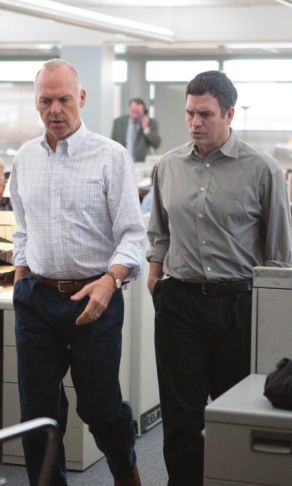
Tom McCarthy’s
Spotlight is a movie that doesn’t have to raise its voice. Much like the reporters it focuses on, this is an assured work, firm in its convictions, telling its story in a factual, non-exploitive way, knowing full well that what it has to say, while necessary, does not need to be shouted from the rooftops. The director takes little joy in telling this tale yet he knows that what he needs to say must be done in an even-handed manner, grounded in a truth that’s irrefutable. No histrionics are necessary; the facts of the story are horrific and gripping enough to hold our interest.
That’s not to say that this excellent film – one of the year’s best – is without emotion or a rote exercise that fails to engage the viewer. Quite the opposite, as this old-school investigative movie puts us firmly in the shoes of its four reporters, letting us in on the step-by-step process they used to uncover a scandal that would rock the Catholic Church to its very foundation, little knowing how it would affect them, their friends, relatives and colleagues.
The reporters of The Boston Globe’s investigative division, known as “Spotlight,” had long been regarded as the gold standard in investigative reporting thanks to their thorough, tenacious and honest work. In 2001, under the direction of new head editor Marty Baron (Liev Schreiber), they are told to begin looking into a series of suspected sexual abuse cases involving priests and children within the powerful Boston Archdiocese. This well-knit team consisting of division editor Robby Robinson (Michael Keaton) and reporters Mike Rezendes (Mark Ruffalo), Sacha Pfeiffer (Rachel McAdams) and Matt Carroll (Brian D’Arcy James) is all too eager to take on the assignment, and what they find becomes an all-consuming mission for them all. They eventually uncover a pattern of abuse involving nearly 90 priests, as well as a system that was put into place to settle the cases quietly and move the offenders from parish to parish or put them on extended leave in an effort to cover up this behavior.
Witnessing the reporters uncover one significant piece of information after another proves gripping, and while the viewer may know how these events played out, this still doesn’t take away from the fascination of discovering how all the pieces fit together and the extensive work involved to do so. However, the heart of the film emerges when Rezendes and Pfeiffer sit down to interview the victims of these crimes, hollow adults whose development has been stunted due to the events that shattered their childhood. These moments are executed, like so much of the film, in a quiet manner that focuses on the gravity of their words as well as the blank or desperate look on their faces. This is a great example of McCarthy’s approach, a less-ismore style that serves the material well. He’s well aware that he does not want to get in the way of the story and that no-frills filmmaking is the manner in which to tell this tale.
Much of the power of Spotlight lies in the sincere performances delivered by its veteran cast, none of whom call attention to themselves singly but as a whole culminate in a powerful ensemble effort. While Ruffalo could have done with one or two less physical tics, there’s no denying the intensity he brings to Rezendes while McAdams does a fine job as Pfeiffer, growing more and more troubled over the implications of her reporting. Schreiber provides a quiet, solid center as the low-key but persistent Baron, Stanley Tucci is on hand with a strong supporting turn as the victims’ lawyer, Mitchell Garabedian, while Keaton continues to impress as Robinson, particularly during a scene when he pushes his calm demeanor to the side when confronting a shady lawyer (Billy Crudup), a moment that eventually has great ramifications for the character.
Spotlight isn’t a flashy movie. Its strength lies in the sincerity with which it’s told, the conviction of its cast and the solidity of its script, which underscores the belief that the pursuit and telling of the truth is paramount no matter what the cost. McCarthy is well aware that this is a lesson that cannot be repeated often enough.